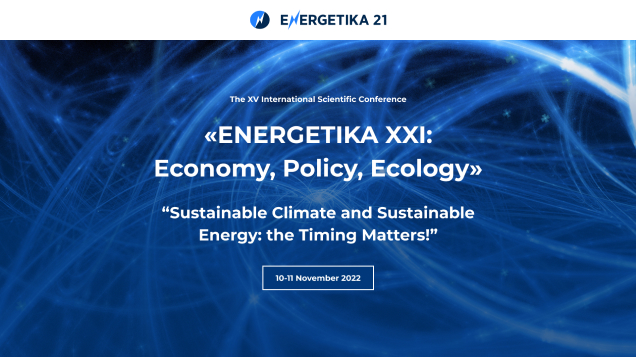The XV International Scientific Conference “Energetika 21: Economy, Policy, Ecology” was held on 10 — 11 November in UNECON in hybrid format. The topic of the conference was “Sustainable Climate and Sustainable Energy: the Timing matters!”.
Energetika 21 is a scientific conference regularly held in November in St. Petersburg, addressing energy, environment and GHG issues by offering a platform to exchange information and ideas on these topics. In times of increasing global tensions, Energetika 21 focuses on topics of common global interest such as the unanimously agreed targets of the Paris Agreement (PA).
It is obvious that energy efficiency and renewable energy have a major role to play to meet the climate targets of the PA (i.e. a sustainable climate). However, renewables (sustainable energy) come with specific challenges as they cannot always provide reliable energy supply. While in the long run an all-renewable energy supply based predominantly on harvesting present sun radiation is mandatory, this will not work within the time frame imposed by the need to stay within 1.5°C. Additional avenues are needed to meet the PA target: substantial and quick reduction of methane emissions, roll out of CCUS as well as development of Bioenergy with Carbon Capture Storage (BECCS) and Direct Air Capture (DAC) to compensate for hard to abate GHG emissions and for some limited overshoot in GHG emissions.
The conference addressed the differences between the target of a sustainable environment and sustainable energy, as well as the instruments to them and the relation and interaction between the various instruments and targets within the different time frames.
The first day of the conference was dedicated to the following topics: common issues of a realistic low-carbon agenda in the world (Michael Sipos, Independent Expert, USA), in Russia (Iana Klementovichius, UNECON and Aleksey Belogoriev, Fund “Institute for Energy and Finance”) and in Central Asia (Aleksey Kobzev, Kazakh-German University (DKU), Kazakhstan), as well as perspectives of CCUS technologies for achieving PA targets on the case of Germany (Ralf Dickel, Independent Expert) and Russia (Ekaterina Grushevenko, Skolkovo Institute of Science and Technology (Skoltech)).
The topic of decarbonisation of coal industry in Russia was emphasized by Irina Mironova and Mikhail Oschepkov from European University at St. Petersburg, as well as decarbonisation of transport and development of Gas Vehicle Market was presented by Vasiliy Zinin, National Gas Vehicle Association. In addition, a promising project of electricity generation from municipal solid waste was presented by Andrey Datchenko from VEB.RF Business Block.
The second day of the conference was devoted to issues of determining the optimal ways towards sustainable energy (Jens Völler, Team Consult, Berlin), determining the timeframe for achieving sustainability of the energy sector (Stanislav Babich, UNECON), approaches to bioenergy and bioenergy using carbon capture and storage technology (Vladimir Korotkov, Yu. A. Izrael Institute of Global Climate and Ecology and Grigoriy Yarygin from Saint Petersburg State University).
More than 60 experts from Russia and foreign countries participated in the conference. Energetika 21 has confirmed its status as a platform for open dialogue on complex energy issues within current geopolitical conditions.
Previous ENERGETIKA conferences and workshops programs, presentations and photos are available at: https://energetika.unecon.ru/archive.html
To register, please, fill out the registration form on the website — https://energetika.unecon.ru/eng










